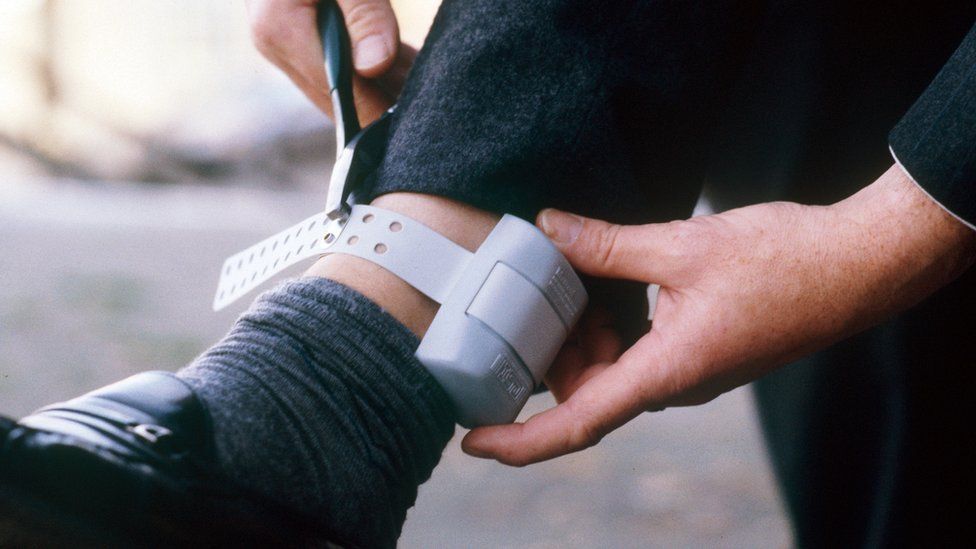Electronic GPS tags to track thousands of criminals in England and Wales
- Published

Thousands of criminals in England and Wales will be tagged with GPS trackers to allow authorities to trace them 24 hours a day.
Currently, electronic tags are linked to a box at a fixed address, such as an offender's home, with alerts generated if they are not there at certain hours.
But the new location tags will track a person's movements wherever they go.
Justice Secretary David Gauke said the tags will better protect victims of domestic abuse or stalking.
Standard electronic tags - largely used to enforce a curfew or house arrest - issue an alert if the person wearing the tag is not present at a particular address during the hours they are meant to be.
Around 60,000 offenders currently wear these standard tags in England and Wales.
The GPS tags can be used to create a no-go zone, check an offender is attending a rehabilitation programme, monitor an offender's behaviour, or ban someone from going within a certain distance of an address - such as a fellow criminal's or victim's home.
The GPS tags, which cost £9 a day, will be rolled out everywhere in England and Wales from this summer.
Officials estimate that around 4,000 people will be GPS-tagged in a year. There will be a maximum of 1,000 tags in use at any one time.
Mr Gauke told the BBC the technology could be used for a "broad range" of offences - as an alternative to custodial sentences for relatively minor crimes, and to monitor more serious offenders once they have been released.
"GPS tagging will help to better protect victims and give them the reassurance that perpetrators will not be able to breach an exclusion zone without triggering an immediate alert," he said.
Mr Gauke said the GPS tags could also help keep people out of gangs.
Anyone who breaches rules that have been imposed on them could then be recalled to prison or brought before the courts.
The government has used electronic tagging services as part of the sentencing and supervision of offenders since 1999. It said the new GPS tags will not replace the current system but be an extra option.
So far, GPS tags have been rolled out to three regions - north-west and north-east England, and the Midlands. The new technology will also be trialled in London particularly for knife crime offenders after they have been released from prison.
The move comes after a 17-month pilot of GPS tags was carried out in eight police forces in England. The Ministry of Justice said the pilot showed GPS tags "can potentially save police investigation time", and could make criminals more compliant.
The MoJ quoted one offender as saying: "I've walked in an exclusion zone before, not realising… that was before I had the tag on, so I wasn't really bothered about getting seen. Now, with the tag, I knew full well that if I go in to that exclusion zone, I'm going to get seen no matter what."
In Scotland, legislation which would bring in the same GPS tagging technology is at the second stage of passing through Parliament. It has been referred back to the committee and will then be debated.
- Published12 July 2017
- Published6 April 2018
- Published16 January 2018
- Published31 October 2018